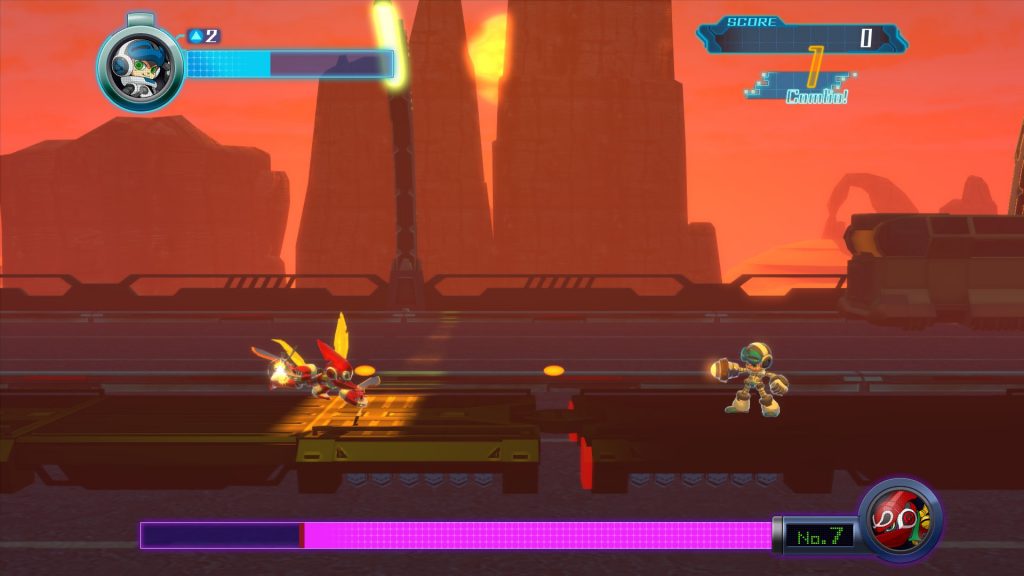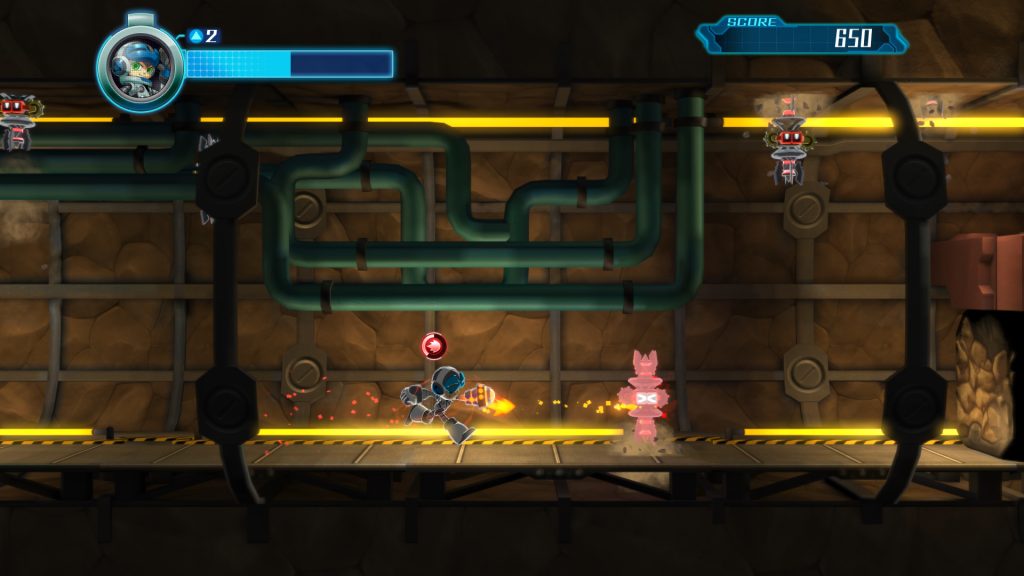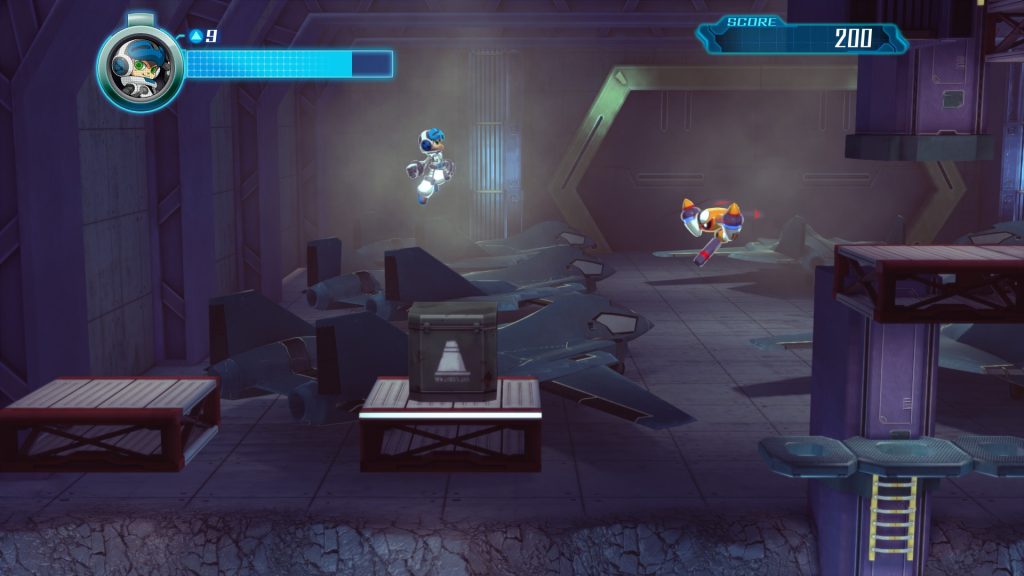
Capcom isn’t releasing a new Mega Man game anytime soon. That’s just something we’re going to have to deal with. The last proper Mega Man game, Mega Man 10, was released in 2010. The last time we got an entry in the Mega Man X series was 2004. Mega Man Legends 3 was canceled despite positive fan reception of early content. About the only time we see Mega Man these days is in things like Super Smash Brothers. Capcom won’t make games for him, but they’re happy to farm out the character when it makes them money
Enter Keiji Inafune, Mega Man co-creator and longtime producer, and his studio, Comcept. When they announced Mighty No. 9 via Kickstarter, it seemed like a revolution. They would do with Capcom wouldn’t. They would give us a new Mega Man game, if in spirit rather than name. People believed in the project so much that they donated $4 million dollars to the game’s Kickstarter. To this day, it remains one of the most successful projects to come from crowdfunding. Only Star Citizen, Shenmue 3, Bloodstained: Ritual of the Night, Torment: Tides of Numenera, Pillars of Eternity, and Psychonauts 2 have raised more money.
Then came the delays. The screenshots that didn’t look anything like what we were initially shown. And more delays. I did not want to talk about the crowdfunding or delays when discussing Mighty No. 9. I wanted to judge the game on its own merits. Plenty of games have come through troubled developments just fine. Plenty of good games have come from crowdfunding. But it’s impossible to separate the game that Mighty No. 9 became from its troubled, protracted development. As I forced myself through exceptionally mediocre level after exceptionally mediocre, visually dull level, I began to wonder where all of that time and money went, because it certainly wasn’t put into polishing the game’s visuals or making sure that the levels were fun to play.
"
The story follows Beck, the titular Mighty No. 9, as he battles to defeat the other Mighty Numbers, a group of special robots who, like all of the other robots around, have suddenly started attacking everything in sight. Like Mega Man, Beck must go through each of their stages, defeat the evil robots that populate them, and take down the other Mighty Numbers. Defeating Beck’s kin grants you variations of their powers, which you can take to other levels and switch between on the fly.
Structurally, it’s almost identical to pretty much any Mega Man game, and if you’ve played any of them before, you’ll know what to expect here. What differs is the core gameplay loop. While games in the Mega Man series revolved around jumping over obstacles and shooting enemies with lemons from Mega Man’s buster, Mighty No. 9 switches it up by making Beck’s dash a critical part of his arsenal. Generally, an encounter goes like this: you run into an enemy and shoot them with Beck’s buster until they’re critically weakened. At this point, they’ll flash a different color, and Beck can dash through them to absorb Xel.
Different enemies grant different Xel: red Xel upgrades your attacks (you cannot charge your buster), green Xel increases your movement speed, and yellow Xel grants you more armor. Get enough blue Xel, and you’ll acquire healing items that can be used from the pause menu. The faster you dash through enemies after weakening them, the more Xel you’ll get, and the more you’ll increase your score and combo meter.
" I would like to stop for a moment and remind you that this game cost four million dollars. Four million. And the characters’ mouths don’t move."
It’s an entertaining loop that helps maintain a fast pace, but it’s about the only thing about Mighty No. 9 that works, and even that comes with major caveats. Despite his comically long strides, Beck absolutely plods without the movement buff, and movement in general feels clunky. So, the core gameplay loop works, despite some jank and how samey it feels after long periods of time. What doesn’t work?
Honestly? Pretty much everything else. I touched briefly on the presentation earlier, but it’s worth bringing up again because Mighty No. 9 is an ugly game. Its color palette mostly consists of browns, greys, and muted blues. The only other frequent colors are the crackling, electric purple that belong to the game’s intensely frustrating instant-death traps. Every now and then, you’ll get to go somewhere cool; you might scale a skyscraper or ride cars along a highway or assault a military base. But mostly you’ll be going down factory corridors that feel, at best, like they’ve been palette-swapped.
I’m not usually one to rag on a game for its visuals, but Mighty No. 9 looks like it could run on the original Xbox. You can try to hold your nose and say graphics don’t matter, and 99% of the time, you’d be right. But you can’t look at the mission select area and see anything more than poor textures and little detail. You can’t look at a cutscene without seeing that the characters don’t emote, or that their mouths don’t move when they speak. That their character portraits don’t change. That they don’t use any kind of body language outside of a few stock positions when communicating. That they all have the same lifeless eyes. I would like to stop for a moment and remind you that this game cost four million dollars. Four million. And the characters’ mouths don’t move.
"Unless you’re fighting one of the game’s bosses (which, it should be noted, are pretty good), you probably won’t be dying while you’re fighting something, and even then, most can be cleared in a couple attempts."
This could be saved with some great art design, but unfortunately the game just doesn’t have it. Like the environments, the characters come off as bland, static, and artificial. None of this would matter if the game didn’t shove the characters down your throat, but it does. After all, Inafune has said he wants Mighty No. 9 to be a multi-media franchise that includes a manga, anime, and a movie. These characters chatter constantly over your gameplay, and it’s meant to be endearing. Sometimes, the game pulls this off. Beck, his creator Dr. White, Battalion (a military Mighty Number trying his damndest to be R. Lee Ermey’s character from Full Metal Jacket), and Avi (a Mighty Number who narrates his stage like a news anchor) are genuinely entertaining.
The rest of the cast is sunk by a bad script or terrible voice acting, or sometimes, both. Worse still, these people never shut up. Their dialogue cannot be skipped or turned off, and when you die (and you will) or run out of lives on a level and have to start from scratch (and you will), you get to hear it all over again. Characters who would otherwise be moderately annoying, like Dr. Sanda, turn into a near-constant pickaxe chipping away the last vestiges of your sanity. No, Dr. Sanda, I do not want to hear you cry for your mother when the lights go out on Mighty No. 3’s stage again, thank you.
This, coupled with the poor-to-average level design, is enough to make you want to both strangle your virtual companions and bash your head into the nearest wall repeatedly in the hopes of just ending it all. The enemies are easy. Unless you’re fighting one of the game’s bosses (which, it should be noted, are pretty good), you probably won’t be dying while you’re fighting something, and even then, most can be cleared in a couple attempts.
"No, what will kill you are the instant death traps, which are used liberally and often cheaply to ensure as many deaths as possible."
No, what will kill you are the instant death traps, which are used liberally and often cheaply to ensure as many deaths as possible. Most are avoidable, but sometimes the game will task you will something inane, like hovering between two instant death traps placed on ceilings and floors of varying heights. Did you die? Do it again. Oh, you died three times. Play the entire level again. Don’t forget to listen to Sanda’s funny jokes about hacking!
You would think that a studio with the experience Comcept has would know better, but Mighty No 9. is drowning in amateur mistakes. One of the most glaring examples is on Mighty No. 8’s stage. Unlike most other stages, the stage actively involves hunting down No. 8, aka Countershade, which means you can travel anywhere on the stage at any time instead of just going from left to right. Pretty neat, right? The issue is that the stage is covered in instant death traps, and dying even once means you have to do the entire thing all over again. Yes, to get to the boss, you have to do the entire stage without dying. Enjoy hearing all that in-level dialogue over and over again!
The heartbreaking thing is that Mighty No. 9 is not devoid of good ideas or fun levels. It’s just a game that riddled with every problem a Kickstarter game can have. Stretch goals led to feature creep (How about that boss rush mode? Multiplayer? New levels and characters?) and the addition of multiple platforms, and you can tell all of these things pushed the developers to the brink and diluted the soul of what this game was supposed to be: a spiritual successor to Mega Man.
"I could go on about Mighty No. 9. There’s plenty more words to be written, almost none of them positive. What you need to know is that it is not a good video game."
I could go on about Mighty No. 9. There’s plenty more words to be written, almost none of them positive. What you need to know is that it is not a good video game. It is not the game Keiji Inafune sold to us with cool and colorful concept art. It is a bad video game. It’s is loaded down with lots of cool ideas that it never fully explores, and frankly it feels unfinished, unpolished, and unplaytested.
Inafune’s fallen on his sword and taken full responsibility for Mighty No. 9’s failings, and it was the right thing to do. Instead of trying to shoot for a multi-media franchise, maybe Inafune and crew should have focused on making a good game first, and proving that he was a legitimate design talent in the industry, and not just a good artist who produced some great games at Capcom. Right now, he looks like he doesn’t even know how to do that.
I will give credit to Mighty No. 9 for one thing. It made me want to play the old Mega Man games. And if Mega Man is on your mind, that’s what you should do, too. Don’t play this. Play Mega Man. Those are the games you really want, anyway. And maybe, just maybe, Capcom will give them to us someday.
This game was reviewed on the PlayStation 4.
Core gameplay loop is solid. Some of the characters are cool. A couple levels are unique and interesting. Boss fights are generally enjoyable.
Poor voice acting and writing. Most of the characters are annoying. Poor visuals, both technically and stylistically. Bad level design that is overly reliant on instant death traps. No way to skip the constant in-level chatter.



















